 July 1, 2021 John E. Ross, KD8IDJ, Editor
| ||||||
FCC Reaffirms Nearly $3 Million Fine for Marketing Unauthorized Drone Transmitters In a Memorandum Opinion and Order (MO&O) released June 17, the FCC denied a Petition for Reconsideration filed by HobbyKing of a $2,861,128 fine for marketing noncompliant RF equipment and for failing to respond to FCC orders in its investigation of the company's practices. In the same step, the FCC enforced its equipment marketing rules. The fine resulted from an FCC investigation initiated by ARRL's January 2017 complaint that the HobbyKing equipment was "blatantly illegal at multiple levels." A representative of the ARRL Electromagnetic Compatibility Committee (ECC) stated, "The Forfeiture Order is the final chapter of a story that started with a report to the ARRL Board by the EMC Committee in 2017, as a result The Electromagnetic Compatibility Committee was credited in the complaint with calling attention to the issue and prompting ARRL's action. As spelled out in ARRL's 2017 complaint, the ARRL Laboratory had documented that the operating frequencies of these drone TV transmitters near the 1.3 GHz amateur band were dip-switch selectable for frequencies internationally assigned for use by Aeronautical Navigation, GPS, GLONASS L1, ATC Mode "S," as well as to both the interrogation and reply frequencies used for Air Traffic Control Air-Route Surveillance "transponder" radar systems. ARRL's complaint noted that given the channel configuration, these units would not have a legitimate amateur radio use, and that the marketing was directed at drone enthusiasts and not to licensed radio amateurs. "ARRL Laboratory tests did prove that only one of the seven available channels was within the 1.3 GHz amateur band," the ECC representative said. "This is another example of ARRL not only affirmatively acting to protect our members' interests, but also acting to protect the safety and security of vital services and the general public," the ECC representative said. HobbyKing had denied that it was marketing its drone transmitters to US customers, but as the ARRL January 2017 complaint pointed out, ARRL Laboratory Manager Ed Hare, W1RFI, was able to purchase two drone transmitters from HobbyKing for testing in the ARRL Lab. "The FCC noted that amateur radio equipment used to telecommand model craft are limited to 1 W (1,000 mW), but three transmitters included in the FCC investigation operated at significantly higher power levels of 1,500 mW and 2,000 mW," ARRL said. HobbyKing had told the FCC that it had no notice of the Commission's authorization requirements; that the Fifth Amendment relieved HobbyKing of its duty to respond; that the forfeiture amount was inappropriate because its parent company, Indubitably, Inc., lacked the ability to pay to the Forfeiture Order; and that the Commission was time-barred from taking action against ABC Fulfillment Services LLC because it was not part of HobbyKing's business. "Upon review of HobbyKing's Petition for Reconsideration and the entire record, we find no basis for reconsideration because the petition fails to present new information warranting reconsideration," the FCC said in the MO&O. HobbyKing is the trade name of two US-based companies that include ABC Fulfillment Services LLC and Indubitably, Inc. Read an expanded version. New Section Managers Appointed in Orange and Eastern Washington Carl Gardenias, WU6D, of Perris, California, is retiring as ARRL Orange Section Manager (SM) after serving in the position since 2003. His term of office had expired at the end of March, but he agreed to continue serving as SM until a successor was chosen. A re-solicitation for Section Manager nominations in the Orange Section was issued this past spring. The only nominee responding by the June 4 deadline was Bob Turner, W6RHK, also of Perris, California. Turner's elected 2-year term of office does not officially In accordance with the Rules and Regulations of the ARRL Field Organization, ARRL Field Services Manager Mike Walters, W8ZY, has appointed Turner to start his term of office as the Orange Section Manager earlier than scheduled, with the appointment effective July 1. Walters made his decision after consulting with ARRL Southwestern Division Director Dick Norton, N6AA, and Gardenias. Turner has been the Section Emergency Coordinator for the past 10 years. ARRL Eastern Washington Section Manager Jack Tiley, AD7FO, will be stepping down early from his term of office that concludes on September 30, 2021. Tiley, of Spokane Valley, has been Section Manager for 2 and a half years. Jo Whitney, KA7LJQ, was the only nominee when the June 4 nomination deadline arrived, and she was declared elected. Whitney was initially scheduled to start her term of office on October 1, but because Tiley is stepping down before the end of his term, Walters -- after consulting with ARRL Northwestern Division Director Mike Ritz, W7VO -- has appointed Whitney to start her term of office on July 1 Whitney, of Yakima, has been an ARRL Emergency Coordinator since 2003, and she served as a District Emergency Coordinator in 2018 and 2019. ARRL Podcasts Schedule
The latest episode of Eclectic Tech (Episode 37) features a discussion about the mysterious Schumann The On the Air and Eclectic Tech podcasts are sponsored by Icom. Both podcasts are available on iTunes (iOS) and Stitcher (Android) as well as on Blubrry -- On the Air | Eclectic Tech. WISA Woodsat Successfully Completes Stratospheric Test Flight The world's first wooden CubeSat successfully completed a test flight into the stratosphere earlier this month. WISA Woodsat is constructed using birch plywood panels in a 1U configuration measuring 10 centimeters squared. Nine small solar cells will power the satellite, which will orbit at an altitude of 500 - 550 kilometers. The novel spacecraft will carry several amateur radio experiments, as well as During the recent test, a functional model of the WISA Woodsat climbed 19 miles into the sky tethered to a weather balloon. The satellite's camera captured a selfie video of the balloon bursting. A parachute deployed to take the nanosatellite back to Earth, where it was recovered intact, lodged in a spruce tree. The test satellite and a duplicate "spare" version, were manufactured at UPM Plywood's Savonlinna, Finland, factory. The company sells its construction-grade panels under the WISA trademark. The panels were thermo-vacuum dried and processed on a CNC machining center. The wooden satellite is based on a basic, versatile CubeSat format, Kitsat, which is designed with educational use in mind. As the sponsor quipped, "WISA Woodsat will go where no wood has gone before. With a mission to gather data on the behavior and durability of plywood over an extended period in the harsh temperatures, vacuum, and radiation of space in order to assess the
use of wood materials in space structures." Once in orbit, Woodsat will be able to extend its selfie stick to capture photographs of the wooden box as it hurtles through space at 40,000 kilometers per hour (24,800 miles per hour). This will allow the mission leaders to monitor the impact of the environment on the plywood. The satellite would downlink its telemetry and images from two cameras using amateur radio frequencies. In addition to testing plywood, the satellite will demonstrate accessible radio amateur satellite communication; host several secondary technology experiments; validate the Kitsat platform in orbit, and popularize space technology. Russian Woodpecker Antenna Array Now a Cultural Heritage Site The massive Duga-1 antenna array that transmitted the obnoxious and infuriating "Russian Woodpecker" HF signal from the 1970s until the late 1980s is now a cultural heritage site. The array, located near Chernobyl in Ukraine, was part of an over-the-horizon radar (OTH-R) Nearly 2,300 feet long and more than 450 feet tall, the steel beams of the radar array are in the Chernobyl exclusion zone tower above the surrounding forest. Seen from a distance, it appears to be a massive wall or the start of a cage. As Vice recently reported, the Association of Chernobyl Tour Operators was the first to announce that Ukraine had made Duga-1 a protected heritage site. The Russian Interfax news service later reported the official designation. "Our heritage is not only the area around the power plant but also the buildings located on its territory," Oleksandr Tkachenko, Ukraine's Minister of Culture and Information Policy, said in a Telegram thread about the announcement. "So now we are working on identifying other
objects that should be part of the list of monuments. Our goal is to prevent destruction when possible." The Soviet Union deployed two similar OTH-R installations -- known and Duga-1 and Duga-2 -- the one near Chernobyl and another in eastern Siberia. Transmitter power levels were rumored to be in the 10-megawatt EIRP range. Duga-1 was the focus of a 2015 documentary, The Russian Woodpecker, by Chad Gracia. The film includes interviews with Duga Commander Vladimir Musiets and others involved in building and operating the OTH-R system. The production was a 2015 Sundance Film Festival winner in the documentary category. In recent years, the Duga-1 radar has also played a role in other films, as well as in various video games and novels. ARRL Learning Network Webinars Visit the ARRL Learning Network (a members-only benefit) to register, check on upcoming webinars, and to view previously recorded sessions. Designing Coiled Coax "Ugly" Baluns -- John Portune, W6NBC / Thursday, July 8, 2021 @ 8 pm EDT (0000 UTC on Friday July 9)
Learning with High-Altitude Balloons -- Jack McElroy, KM4ZIA, and Audrey McElroy, KM4BUN / Thursday, July 22, 2021 @ 3:30 pm EDT (1930 UTC) Jack McElroy, KM4ZIA, and Audrey McElroy, KM4BUN, talk about their experiences with high-altitude balloons, explain how others can get involved in high-altitude balloons, and discuss launching it successfully. Their discussion will include how high-altitude balloons are a great way to involve more youth in ham radio and how they can be a fantastic learning experience for students. ARRL members may register for upcoming presentations and view previously recorded Learning Network webinars. ARRL-affiliated radio clubs may also use the recordings as presentations for club meetings, mentoring new and current hams, and discussing amateur radio topics. The ARRL Learning Network schedule is subject to change. Youth on the Air Camp 2021 to be On the Air and Streaming Selected Events Online The first Youth on the Air (YOTA) camp for young radio amateurs in North, Central, and South America begins on July 11 in West Chester, Ohio. Among other activities, campers will be operating special event station W8Y from both the National Voice of America "We are at 23 campers," said Camp Director Neil Rapp, WB9VPG. "We are very excited to finally bring this program to the Americas. Our young people are bringing an incredible lineup of hands-on sessions for their peers. We hope this pilot gives us the information we need to replicate this camp over multiple locations for years to come. We also hope this brings a more robust community of young hams into amateur radio." The long-awaited summer camp for up to 30 hams aged 15 through 25 had been set to take place in June 2020, but it had to be rescheduled until summer 2021 because of COVID-19 pandemic concerns. The camp for young hams in the Americas took its cue from the summer Youngsters on the Air camps held for the past few years in various IARU Region 1 countries. W8Y will be on the air as campers complete projects, between sessions, and during free time. Dedicated operating times on HF will be Monday, July 12, 0100 - 0330 UTC; Tuesday, July 13, 0000 - 0330 UTC and 1800 - 2130 UTC. Dedicated satellite station operating times will be Thursday, July 15, 1400 - 1700 UTC, and Friday, July 16, 1500 - 1700 UTC. An Amateur Radio on the International Space Station (ARISS) contact is currently set for either Wednesday, July 14, at 1503 UTC, or
Thursday, July 15, at 1416 UTC. It will be streamed live on the Youth on the Air YouTube channel. The camp opening observance on Sunday, July 11, 2100 - 2230 UTC, will feature keynote speaker Tim Duffy, K3LR. The hour-long closing ceremony on Friday, July 16, will get under way at 1700 UTC. The YouTube channel will also feature a daily video highlighting the activities of the previous day. ARRL and The Yasme Foundation donated project kits for the campers. X Tronics provided temperature-controlled soldering stations. The brochure on the Youth on the Air website includes more details about the camp. For additional information, contact Camp Director Neil Rapp, WB9VPG. The K7RA Solar Update Tad Cook, K7RA, Seattle, reports: Solar activity is strong. Average daily sunspot number rose from 14 to 34.7, and average daily solar flux increased from 79.3 to 86.9. Both figures represent a dramatic increase in solar activity.
Predicted solar flux is 94 on July 1 - 7; 90 on July 8; 85 on July 9 - 11; 82 on July 12 - 14; 80 on July 15 - 18; 82 on July 19; 85 on July 20 - 24; 88 on July 25; 90 on July 26 - 28; 92 on July 29 - August 1; 90 on August 2, and 85 on August 3 - 7. Predicted planetary A index is 12, 8, 12, 8, and 10 on July 1 - 5; 5 on July 6 - 8; 8 on July 9 - 10; 5, 15, and 12 on July 11 - 13; 5 on July 14 - 20; 8 on July 21; 5 on July 22 - 26; 10 on July 27; 5 on July 28 - 30; 12 on July 31; 5 on August 1 - 4, and 8 on August 5 - 6. W9NY reported on June 28: "The propagation on 20 meters between my Dune Acres, Indiana, station and much of Europe and Asiatic Russia beginning last night at 11 PM and continuing for about 2 hours was absolutely amazing. It reminded me of 10 meters at the peak of prior sunspot cycles. And today there was a fair amount of activity on 10 and 6 meters." More details in the Friday K7RA Solar Update. Sunspot numbers for June 24 - 30 were 11, 25, 16, 32, 50, 56, and 53, with a mean of 34.7. The 10.7-centimeter flux was 80.6, 83.4, 82.4, 87, 88.6, 92.5, and 94.1, with a mean of 86.9. Estimated planetary A indices were 5, 7, 4, 4, 4, 5, and 14, with a mean of 6.1. Middle latitude A index was 6, 8, 5, 4, 4, 5, and 11, with a mean of 6.1. A comprehensive K7RA Solar Update is posted Fridays on the ARRL website. For more information concerning radio propagation, visit the ARRL Technical Information Service, read "What the Numbers Mean...," and check out this Propagation Page. A propagation bulletin archive is available. For customizable propagation charts, visit the VOACAP Online for Ham Radio website. Share your reports and observations. Amateur Radio in the News ARRL Public Information Officers, Coordinators, and many other member-volunteers help keep amateur radio and ARRL in the news.
Share any amateur radio media hits you spot with us. Announcements
In Brief...
Just Ahead in Radiosport
Upcoming ARRL Section, State, and Division Conventions Many conventions and hamfests have been canceled or postponed due to the coronavirus pandemic. Check the calendar of canceled events on the ARRL website.
Find conventions and hamfests in your area. ARRL -- Your One-Stop Resource for Amateur Radio News and Information .
Subscribe to...
Free of charge to ARRL members...
| ||||||
.JPG) ARRL Headquarters will be closed on Monday, July 5, for the Independence Day holiday. There will be no W1AW bulletin or code practice transmissions. ARRL HQ will reopen on Tuesday, July 6, at 8 AM EDT. Have a safe and enjoyable holiday!
ARRL Headquarters will be closed on Monday, July 5, for the Independence Day holiday. There will be no W1AW bulletin or code practice transmissions. ARRL HQ will reopen on Tuesday, July 6, at 8 AM EDT. Have a safe and enjoyable holiday!.jpg) of the discovery that aerial drone TV transmitting equipment was being imported and marketed without proper FCC authorization under FCC Part 15 rules."
of the discovery that aerial drone TV transmitting equipment was being imported and marketed without proper FCC authorization under FCC Part 15 rules." .jpg) begin until October 1, and Gardenias has said he wished to step down as Section Manager at the end of June.
begin until October 1, and Gardenias has said he wished to step down as Section Manager at the end of June..jpg) Check out the May episode of the On the Air podcast (Episode 17) features a discussion with Ward Silver, N0AX, about the importance of station grounding.
Check out the May episode of the On the Air podcast (Episode 17) features a discussion with Ward Silver, N0AX, about the importance of station grounding..jpg) Resonances and a chat with Grant Connell, WD6CNF, about an interesting Morse sending and receiving application he has created for Windows.
Resonances and a chat with Grant Connell, WD6CNF, about an interesting Morse sending and receiving application he has created for Windows. photo downlinking, including selfies. A goal of the project is to determine how well wood products will perform in space.
photo downlinking, including selfies. A goal of the project is to determine how well wood products will perform in space.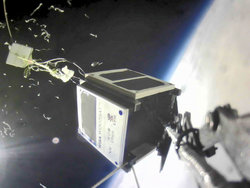
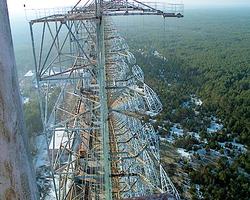 system designed to detect and offer early warning of incoming ballistic missiles from the US. A complementary receiver site was located some 40 miles away. While the system was operating, its broad rat-a-tat signal, typically at a 10 Hz rate, caused severe interference in the amateur bands. The Chernobyl nuclear power plant disaster and the end of the Cold War preceded the end of the system and the interference it caused. NATO military intelligence discovered and photographed the structure, which it dubbed "Steel Yard."
system designed to detect and offer early warning of incoming ballistic missiles from the US. A complementary receiver site was located some 40 miles away. While the system was operating, its broad rat-a-tat signal, typically at a 10 Hz rate, caused severe interference in the amateur bands. The Chernobyl nuclear power plant disaster and the end of the Cold War preceded the end of the system and the interference it caused. NATO military intelligence discovered and photographed the structure, which it dubbed "Steel Yard."-Ingmar-Runge-photo.jpg)
 Coiled coax baluns are familiar, but not many hams know how to design them for maximum efficiency. The many designs available online can be confusing, so this presentation will help you learn the following: (1) The main function of a balun; (2) Calculating, and not guessing, at the amount of coax needed; (3) Self-resonance and frequency limitations. The presenter is the February 2021 QST Cover Plaque Award winner for his article "Create Your Own 1:1 Coax Choke Balun." Sponsored by PreppComm.
Coiled coax baluns are familiar, but not many hams know how to design them for maximum efficiency. The many designs available online can be confusing, so this presentation will help you learn the following: (1) The main function of a balun; (2) Calculating, and not guessing, at the amount of coax needed; (3) Self-resonance and frequency limitations. The presenter is the February 2021 QST Cover Plaque Award winner for his article "Create Your Own 1:1 Coax Choke Balun." Sponsored by PreppComm. 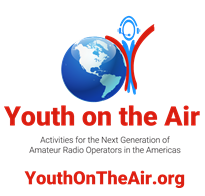 Museum of Broadcasting in West Chester Township and from the camp hotel. The camp will run until July 16.
Museum of Broadcasting in West Chester Township and from the camp hotel. The camp will run until July 16.
 Planetary A index went from 5.3 to 6.1, while average daily middle latitude A index held steady at 6.1.
Planetary A index went from 5.3 to 6.1, while average daily middle latitude A index held steady at 6.1.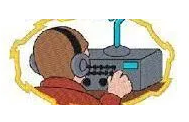 The Canadian American Net (
The Canadian American Net (.JPG) Church Rd, Moravian Falls, NC 28654. (828) 855-8869.
Church Rd, Moravian Falls, NC 28654. (828) 855-8869.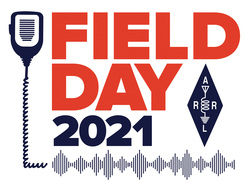 Field Day entries are arriving fast and furious. Three days into the Field Day entry submission period (June 30), entries already have topped 3,000. ARRL Contest Program Manager Paul Bourque, N1SFE, says 201 of these are three-or-more-operator club entries (Class A); 385 are one- or two-person club or group entries (Class B); 33 are mobile entries (Class C), and 34 entered as EOC stations (Class F). "2,414 entrants operated from home stations -- 1,831 as Class D (commercial power) and 583 as Class E (emergency power)," Bourque said. "Last year, there were 10,213 total entrants -- 611 as Class A; 1,086 as Class B; 134 Class C; 6,318 Class D; 1,980 Class E, and 84 Class F. In 2019, before the pandemic, there were 3,113 total entries." -- Thanks to ARRL Contest Program Manager Paul Bourque, N1SFE
Field Day entries are arriving fast and furious. Three days into the Field Day entry submission period (June 30), entries already have topped 3,000. ARRL Contest Program Manager Paul Bourque, N1SFE, says 201 of these are three-or-more-operator club entries (Class A); 385 are one- or two-person club or group entries (Class B); 33 are mobile entries (Class C), and 34 entered as EOC stations (Class F). "2,414 entrants operated from home stations -- 1,831 as Class D (commercial power) and 583 as Class E (emergency power)," Bourque said. "Last year, there were 10,213 total entrants -- 611 as Class A; 1,086 as Class B; 134 Class C; 6,318 Class D; 1,980 Class E, and 84 Class F. In 2019, before the pandemic, there were 3,113 total entries." -- Thanks to ARRL Contest Program Manager Paul Bourque, N1SFE The third
The third .jpg) Moonbounce enthusiast Steve McDonald, VE7SL, wanted to determine a back-to-basics equipment complement for making 2-meter EME contacts. He came up with a nine-element Yagi, a 120 W amplifier, and an antenna position-control system that offered azimuthal rotation but not elevation. The time available to make EME contacts was less than if he'd had elevation control. His
Moonbounce enthusiast Steve McDonald, VE7SL, wanted to determine a back-to-basics equipment complement for making 2-meter EME contacts. He came up with a nine-element Yagi, a 120 W amplifier, and an antenna position-control system that offered azimuthal rotation but not elevation. The time available to make EME contacts was less than if he'd had elevation control. His 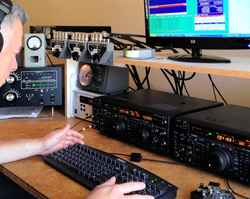 July 5 -- K1USN Slow Speed Test (CW, maximum 20 WPM)
July 5 -- K1USN Slow Speed Test (CW, maximum 20 WPM).jpg)








